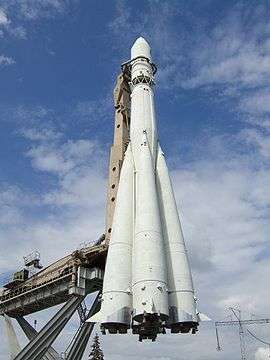Vostok (rocket family)
 Vostok 8K72K rocket on display in Moscow at the All Russia Exhibition Centre | |
| Function | Carrier rocket |
|---|---|
| Manufacturer | RKK Energia |
| Country of origin | USSR |
| Size | |
| Stages | 2 |
| Capacity | |
| Payload to LEO | 4,725 kilograms (10,417 lb) |
| Associated rockets | |
| Family | R-7 |
| Comparable |
Atlas Titan |
| Launch history | |
| Status | Retired |
| Launch sites |
Baikonur: LC-1/5, 31/6 Plesetsk: LC-41/1, 43/3, 43/4 |
| Total launches |
Vostok-L: 4 Vostok-K: 13 Vostok-2: 45 Vostok-2M: 94 Soyuz/Vostok: 2 |
| Successes |
Vostok-L: 3 Vostok-K: 11 Vostok-2: 40 Vostok-2M: 92 Soyuz/Vostok: 2 |
| Failures |
Vostok-L: 1 Vostok-K: 2 Vostok-2: 5 Vostok-2M: 2 |
| First flight | 15 May 1960 (Vostok-L) |
| Last flight | 29 August 1991 (Vostok-2M) |
| Notable payloads |
Vostok Zenit Meteor |
| Boosters (Vostok-K) | |
| No. boosters | 4 |
| Engines | 1 RD-107-8D74-1959 |
| Thrust | 970.86 kN |
| Total thrust | 3,883.4 kN |
| Burn time | 118 seconds |
| Fuel | RP-1/LOX |
| First stage (Vostok-K) | |
| Engines | 1 RD-108-8D75-1959 |
| Thrust | 912 kN |
| Burn time | 301 seconds |
| Fuel | RP-1/LOX |
| Second stage (Vostok-K) | |
| Engines | 1 RD-0109 |
| Thrust | 54.5 kN |
| Burn time | 365 seconds |
| Fuel | RP-1/LOX |
Vostok (Russian Восток, translated as "East") was a family of rockets derived from the Soviet R-7 Semyorka ICBM designed for the human spaceflight programme. This family of rockets launched the first artificial satellite (Sputnik 1) and the first manned spacecraft (Vostok) in human history. It was a subset of the R-7 family of rockets.
On March 18, 1980 a Vostok-2M rocket exploded on its launch pad at Plesetsk during a fueling operation, killing 48 people. An investigation into a similar – but avoided – accident revealed that the substitution of lead-based for tin-based solder in hydrogen peroxide filters allowed the breakdown of the H2O2, thus causing the resultant explosion.
Variants
The major versions of the rocket were:
- Luna 8K72 - used to launch the early Luna spacecraft
- Vostok-L 8K72 - Variant of the Luna, used to launch prototype Vostok spacecraft
- Vostok-K 8K72K - a refined version of the above. This was the version actually used for human spaceflight
- Vostok-2 8A92 - used for launching Zenit reconnaissance satellites throughout the 1960s
- Vostok-2M 8A92M - modified version for launching Meteor weather satellites into higher orbits.
- Soyuz/Vostok 11A110 - hybrid of Soyuz and Vostok rockets used as an interim for two launches
Vostok 8K72K
- Stage number: 1 - Strap-on boosters; 4 x Vostok 8K72K-0
- Stage number: 2 - Core stage; 1 x Vostok 8K72K-1
- Gross mass: 100,400 kg
- Empty mass: 6,800 kg
- Thrust (vac): 912 kN
- Isp: 315 seconds (3.09 km/s)
- Burn time: 301 s
- Isp(sl): 248 seconds (2.43 km/s)
- Diameter: 2.99 m
- Length: 28.00 m
- Propellants: Lox/Kerosene
- Engine: 1 x RD-108-8D75-1959
- Stage number: 3 - Final stage; 1 x Vostok 8K72K-2
- Gross mass: 7,775 kg
- Empty mass: 1,440 kg
- Thrust (vac): 54.5 kN
- Isp: 326 seconds (3.20 km/s)
- Burn time: 365 s
- Diameter: 2.56 m
- Span: 2.56 m
- Length: 2.84 m
- Propellants: Lox/Kerosene
- Engine: 1 x RD-0109
Gallery
 Vostok rocket
Vostok rocket.jpg) Vostok rocket
Vostok rocket
See also
This article is issued from Wikipedia - version of the 5/7/2016. The text is available under the Creative Commons Attribution/Share Alike but additional terms may apply for the media files.
